Iranian Diaspora In US, Canada Slam Chemical Attacks On Schoolgirls
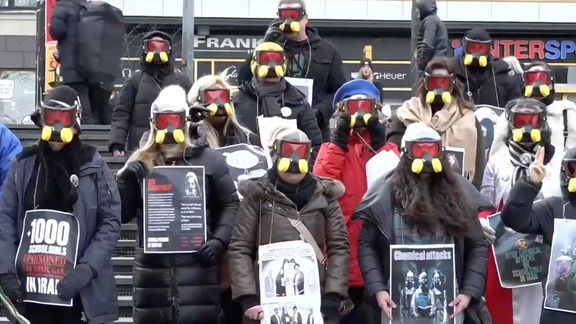
Demonstrations took place across the United States and Canada on Saturday to condemn the more than three months of chemical attacks on girls’ schools around Iran.

Demonstrations took place across the United States and Canada on Saturday to condemn the more than three months of chemical attacks on girls’ schools around Iran.
The United States is home to the world's largest Iranian community outside the country with almost 400,000 living there.
The Iranian diaspora led rallies in cities including New York and Washington, where hundreds of participants marched in front of the White House to demand the support of the US government and the international community for the protests inside Iran.
Similar events were also held in San Diego and Philadelphia. In Canada, Iranians joined forces in Montreal, Ottawa, Toronto and Vancouver to show solidarity with the hundreds of girls affected by mysterious chemical attacks in scores of schools across the country since November.
In Toronto, protesters held a rally in front of the Parliament of Ontario province, chanting slogans to censure the attacks on schoolgirls in different cities of Iran including Tehran, Qom, Karaj, Boroujerd, etc.
The government has aired ‘confessions’ of those allegedly responsible for the attacks which started three months ago as a man and his daughter forced to speak to national TV. The broadcast has all the trademarks of the regime’s forced confessions.
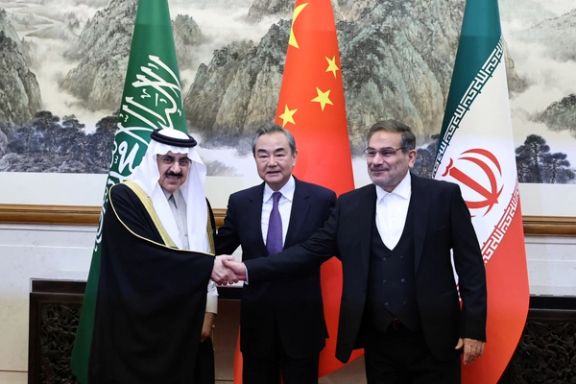
Saudi Arabia will watch Iran's behavior during the two-month window agreed upon to restore relations, Saudi columnists said on Sunday.
The opinion reflected continued wariness in the longtime rivalry between the region's Sunni Muslim and Shi'ite powers.
The breakthrough on Friday brokered by China, a major trade partner of both countries, followed several rounds of Saudi-Iranian talks held in the region in a bid to contain tensions, at a time of frustration by Saudi Arabia and regional allies over what they perceive as gradual US disengagement from the region and negotiations with Iran.
Tehran and Riyadh said they had agreed to resume diplomatic relations and re-open embassies within two months, adding that their foreign minister would meet to implement the deal, without mentioning a more detailed timeline.
"The two-month period ... is the first test of Iran's credibility and proof of good intentions as we must see the start of real change in the regional landscape and a real correction in its dealings with the Kingdom," Saudi columnist Hamoud Abu Taleb wrote in Okaz, a Saudi daily.
A main source of tension is Yemen, where Riyadh leads a military coalition that has since 2015 been battling the Iran-aligned Houthi movement -- which has during the war launched missile and drones at the kingdom.
Abdullah al-Otaibi, in an Op-ed in Saudi-owned Asharq Al-Awsat newspaper, agreed the timeline to reopen embassies would "test" Iran's commitment and said Beijing could play a more effective role than "failed" Western efforts with Tehran.
Persian Gulf Arab states have grown increasingly disillusioned with key ally and security guarantor the United States, including over global powers' 2015 nuclear pact with Iran which they deemed flawed for not tackling Iran's missile program and proxies.
Since the news of the Iranian-Saudi deal broke on Friday, many commentators have seen the development as a win for China that brokered the agreement.
The Wall Street Journal in an editorial blamed Biden and the Democrats for annoying the Saudis and pushing them into China’s arms. The Journal said, “the symbolic import is hard to miss as Democrats in Washington do everything they can to harass and annoy the Saudis,” adding that getting a cold shoulder from Washington Riyadh decided to “hedge” its bets.
Saudi Arabia and the United Arab Emirates have moved to assert more control over regional stability by pursuing conciliatory foreign policies they hope will allow them to focus on economic priorities.
The Wall Street Journal and the New York Times reported this week that Saudi Arabia is demanding concessions from the Biden administration to join the peace accords with Israel. It wants US assistance in developing a nuclear power industry and less restrictions on arms sales to the kingdom. Many see the Chinese-brokered deal with Iran as further pressure by Riyadh on both the United States and Israel.
"It is natural to have diplomatic ties even if at a low level because Iran's expansionist approach has created many touch points with Saudi Arabia....(But) we have to keep our eyes open," wrote Saudi columnist Tariq al-Homayed.
"China is the guarantor for this agreement. This will be important if Iran does not comply," he added.
The United States has voiced reservations about deepening ties between Persian Gulf states and its economic rival China, whose president attended a Gulf summit in Riyadh last year at a time of severe strains in the strategic US-Saudi relationship.
Riyadh and Abu Dhabi have repeatedly said they are looking to diversify their strategic partners while pressing Washington for concrete commitments to regional security.
With reporting by Reuters
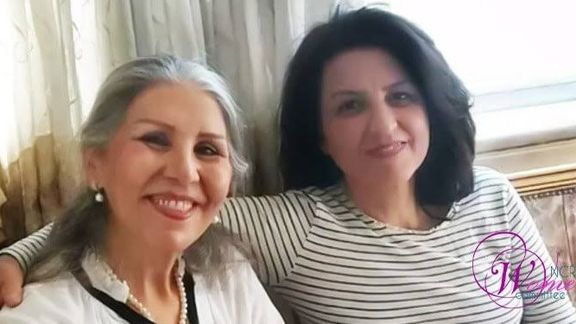
A group of Iranian civil activists issued a statement protesting "heavy and unfair" sentences against two well-known Baha'i figures.
Bahai community leaders Fariba Kamalabadi, 60, and Mahvash Sabet Shahriari, 70, were handed new 10-year sentences in December after having served 10 years previously on charges of threatening national security.
”The two women have spent many days of their lives in prisons for being Baha'i. No one should be harassed or persecuted just because of their beliefs and religion," reads a statement signed by journalists, lawyers, former political prisoners and activists inside and outside Iran.
The group said the accusations against the women are “baseless”, the ‘trial’ conducted in November lasting just one hour. At the time, the Baha'i International Community said it was "an unbelievable injustice”.
It is four years since the two ladies were released from their first decade-long sentence, and activists including Shirin Ebadi and Atena Daemi, say the two are being persecuted on “unfounded charges".
The Shia clergy consider the Baha’i faith as a heretical sect. The Baha'i community, who number around 300,000 in Iran, are systematically prosecuted, discriminated against, and harassed. They cannot hold jobs in the public sector and are sometimes sacked from their jobs in the private sector under pressure from authorities.
In September, the BIC reported 245 incidents of persecution over 32 days, with arrests and imprisonment, the destruction of homes and confiscation of properties, raids on private and business premises, beatings, the denial of medication to detainees and the denial of higher education to more than one hundred young people.
Human rights defenders and international institutions always consider the behavior of the Islamic Republic of Iran in dealing with Baha’i citizens as a "systematic violation of human rights".

The decline of American and “Zionist power” has begun, military advisor to Iran’s ruler Ali Khamenei said Sunday, following a Chinese brokered deal with Saudis.
General Yahya Rahim Safavi was echoing sentiment expressed by all forces in Iran who are considered “Principlist” or loyal to Khamenei, who for years has espoused a policy of siding with China and Russia against the United States.
China appeared to be the power that brokered a deal between Tehran and Riyadh to restore diplomatic relations after seven years of open animosity and rivalry. One Iranian commentator said Sunday that the agreement signed in Beijing was not really a bilateral deal, but a tripartite agreement between Iran, China and Saudi Arabia.
In fact, Tehran and Riyadh had been negotiating since 2021 in Baghdad, with Iraqi mediation and could have restored relations without Beijing’s mediation. Former Iraqi Prime Minister Mustafal al-Kadhimi in an interview with Asharq Al-Awsat published Sunday, says that most of the talks took place in Baghdad.
At this point we do not know what brought China into the picture, except assuming that either Iran or Saudi Arabia insisted on it. If the demand came from the Saudis, it could mean one thing, showing displeasure with the Biden administration, which is left picking up the pieces.
Khamenei’s advisor Safavi in his remarks did not repeat the typical rhetoric of war and confrontation, advising that Iran and Saudi Arabia should exhibit rationality for the sake of West Asia. He said that restoration of bilateral ties was not against any regional countries. But he quickly added that it is natural for the United States to be worried and try to disrupt it.
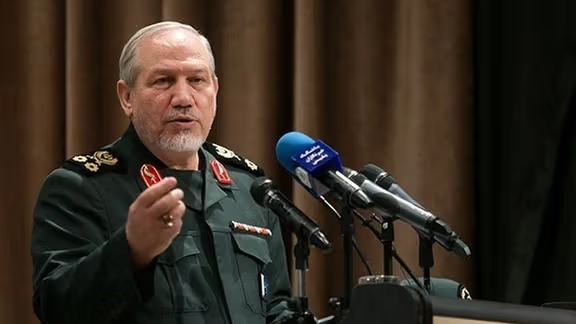
Speculations abound in Iranian media about the potential dividends of peace with Saudi Arabia. Some see it as an Iranian victory to potentially disrupt a possible Saudi peace deal with Israel. Others speak of economic benefits for the Islamic Republic, going as far as claiming that Iran, Saudi Arabia and Russia can create a powerful oil cartel with Chinese backing and put the West on the defensive.
Safavi in his remarks also mentioned a similar outlook. “Iran should regard the West’s entanglement in Ukraine and the Taiwan tensions as an opportunity and based on shared interests with Russia and China move ahead with a clear strategy, given US threats against all three countries.”
The quick face-about of Iran hardliners and Khamenei loyalists regarding Saudi Arabia is being highlighted by their rivals, the reformists, who point out that there was no need to attack the Saudi embassy in Tehran in January 2016 and create tensions for seven years.
They argue that hardliners were calling for the destruction of the Saudi monarchy and equating the country with “Zionists”, calling it a US puppet. Meanwhile, Tehran spent tens of billions of dollars to finance the war in Yemen against Riyadh and provoked the ire of Persian Gulf Arab states.
Now, facing more international isolation and a broken economy, the Khamenei camp is suddenly praising friendship with Riyadh, something they could have done all along.
Safavi insisted that the agreement with Saudi Arabia was “a political earthquake” and the end of “American hegemony in the region”. We this deal, the “post-American era starts in the Persian Gulf region.”
He went on to say that “The Chinese are determined to become the top global economy by 2030 and this agreement brokered by the Chinese is the second big blow by China against America.”
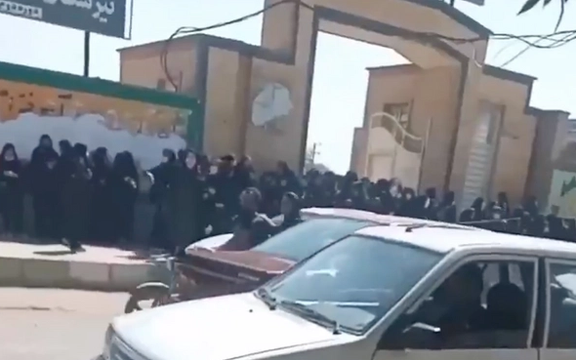
Iran's interior ministry announced Saturday the arrest of over 100 people in eleven provinces in connection with poisoning attacks on dozens of girls’ schools.
The attacks that started three months ago have continued without any apparent effort by the government to seriously pursue the perpetrators or explain to terrified parents and students what was happening in so many schools.
In its statement, the ministry attributed some of the poisoning attacks to “pranks” by students using “foul smelling and harmless substances” in an attempt to get their classes dismissed.
“Among the detainees there are individuals with hostile motivations,” the statement said, adding that these individuals meant to cause fear and panic among the people to shut down schools and cast the blame on the regime.
“These individuals are under investigation to reveal their possible connection with terrorist organizations such as the monafeghin,” the statement said. Iranian authorities always refer to the Mujahedin-e Khalq Organization (MEK) as monafeghin (hypocrites).
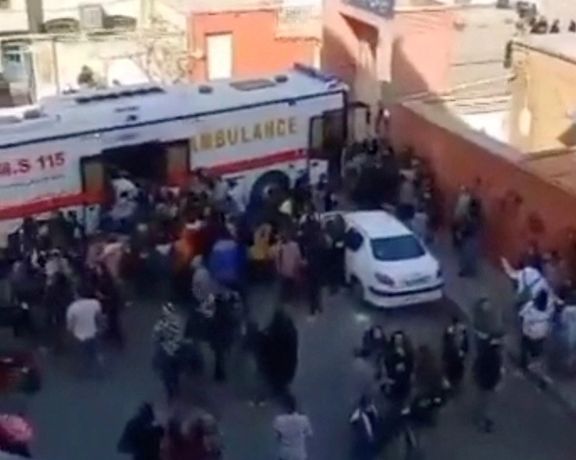
The statement reveals very little about the arrests but two days earlier the local channel of the state television in Fars province aired the so-called ‘confessions’ of a man and his daughter arrested and accused of attacking schools with N2 gas canisters. The statement provided no names for those arrested or any other information.
Many ordinary Iranians have been suspicious of involvement of the regime itself, or religious extremists protected by the regime, in the school attacks and call the acts “state terrorism”.
“There is strong suspicion that the purpose of the attacks is quashing the Woman, Life, Freedom movement by instilling fear among girls and their families,” an umbrella teachers' association said while calling the attacks “bioterrorism” and demanding Supreme Leader Ali Khamenei and other top religious figures to condemn the attacks expressly and decisively.
Diaspora Iranian held protests Saturday in 70 cities around the world to demand action to stop the school attacks.
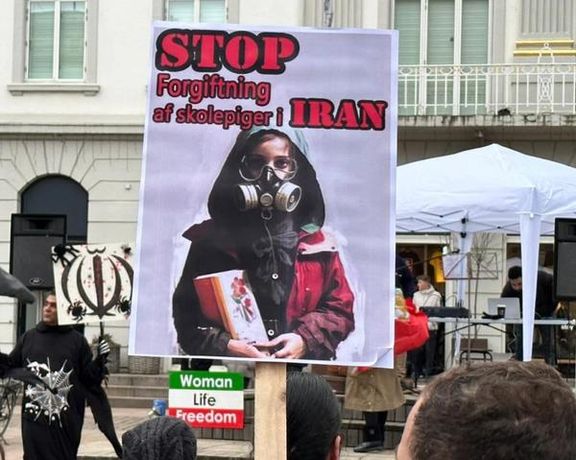
The ministry said in its statement that there is a “considerable drop” in school poisoning attacks although seven more schools were affected on Saturday and tens of students had to be taken to hospital.
Attacks were reported in southwestern Khuzestan province where four schools were targeted. Tens of poisoned students had to be taken to hospitals also in southern Fars, western Kordestan and in northern Gilan provinces.
In a report Saturday, the judiciary claimed that “less than ten percent” of students reported poisoned so far had inhaled “an irritant gas which is not of weapons grade or deadly” and the remaining ninety percent were only affected by stress and other psychological factors.
In an article entitled “Casting Light On Psychological Operations Of Criminals In Student Poisoning Incidents” on Tuesday, the hardliner Mashregh news website accused a banned teachers’ association of using the attacks to wage psychological war against the Islamic Republic to revitalize the protest movement.
The article claimed that it was the MEK that described the school poisonings as ‘chemical attacks’ for the first time and alleged a connection between MEK and union activists who also referred to the incidents as chemical attacks on schools.
Earlier this month, the association urged its members and others to stage protests to demand urgent resolution to school attacks as well as teacher’s own problems including a wage increase for the next year that takes the factor of inflation into account.
In response to the association’s call, teachers and parents held rallies in dozens of cities and chanted slogans such as "death to the child-killing regime".
“Think-tanks of security and intelligence bodies are projecting their own responsibility over the poisoning of students and building new legal cases against union and civil activist,” Mohammad Habibi, spokesman of the Iran Teachers’ Trade Association, said in an Instagram post Saturday.
Habibi vowed that teachers would continue to defend “our children and their achievements [in the protest movement].” “Our message to them is clear: we will not withdraw [against pressures by the security forces].”
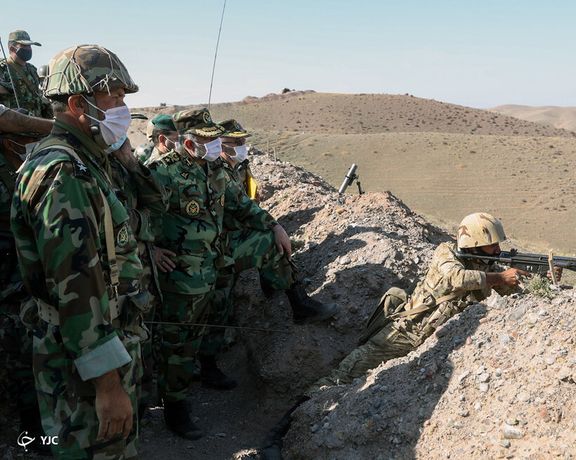
Foreign Ministry of Azerbaijan summoned the Iranian ambassador in Baku Saturday to protest the flight of an Iranian warplane on the border of the two countries.
Ambassador Abbas Mousavi was called to the foreign ministry and told that Saturday morning local time a warplane continuously flew near the Azerbaijani border for more than 40 minutes at a distance of 3-5 kilometers.
Azerbaijan called the incident “provocative and unfriendly.”
A statement issued by Baku said that the Islamic Republic also held “large-scale military drills last year along the Aras river near the borders of Azerbaijan.”
An attack by a gunman on Azerbaijani embassy in Tehran in January that killed the missions security chief led to heightened tension between the two countries.
Relations have been tense since 2020 when Azerbaijan defeated Armenia in a war and recaptured territory occupied by Armenian forces since the early 1990s. It then took further military action in 2022 trying to occupy territory in Armenia proper, threatening to cut off Iran’s link with its northern neighbor. Iran has repeatedly warned Baku not to attempt to change international borders.
Tehran also accuses Baku of harboring Israeli intelligence and military elements that plan to use its territory in a possible attack against Iran’s nuclear installations.
However, Azerbaijan's ambassador-designate to Israel Mukhtar Mammadov said recently that his country would not allow Israel’s military to use its territory as a base for a possible attack against Iran.
Mammadov also rejected reports that Azerbaijan would allow the Mossad to set up a branch in Azerbaijan to monitor what is happening in Iran.